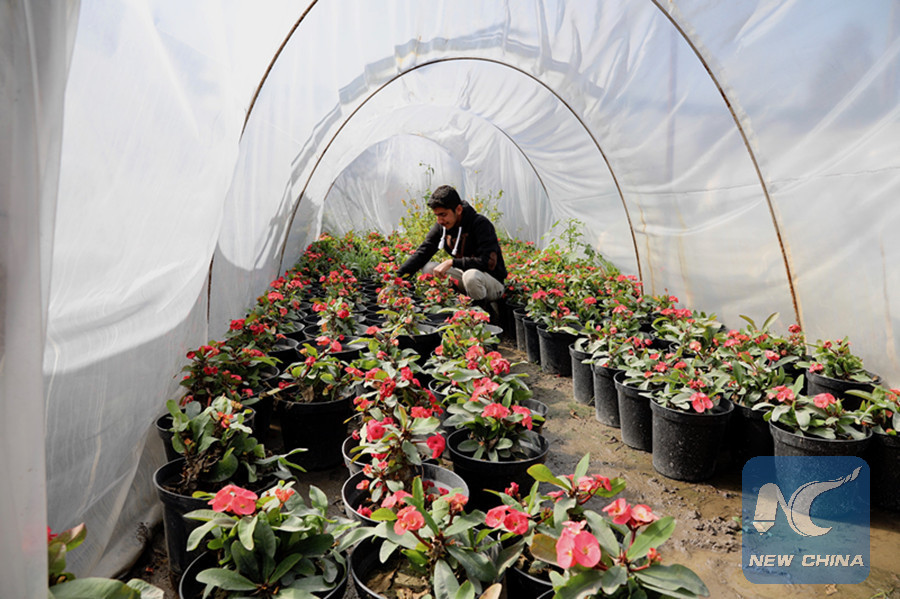
In this picture taken on Feb. 18, 2018, a young Iraqi man checks flowers in a flower nursery in suburban Baghdad, Iraq, as the rise of flower sales creates more jobs amid post-IS economic recovery. (Xinhua/Khalil Dawood)
BAQUBA, Iraq, March 22 (Xinhua) -- Omer Mohammed, an Iraqi college student, found a job this spring at a flower nursery in Baquba which sells rare species of flowers and trees.
"In spring, the flower nurseries are doing brisk business, and I have been waiting for a long time to get the job," said Mohammed, 20, who works with 10 other young co-workers at the nursery run by one of his relatives.
He is very satisfied with his new job which earns him 18 U.S. dollars a day, which can pay his tuition and help his family.
Mohammed goes to a college at the suburb of Diyala's provincial capital Baquba, some 65 km northeast of the capital Baghdad.
Baquba, known as the City of Orange, is the center of Iraq's commercial orange groves. It lies on the Diyala River, one of the main tributaries of the Tigris river, which irrigates many date and fruit orchards.
Ali al-Zaidy, who owns a nursery at the southern entrance of Baquba, told Xinhua that "flower nurseries in spring provide hundreds of jobs for youths that would decrease the unemployment rate."
Zaidy considers the brisk business of flower nurseries as a symbol of the economic recovery in Diyala province.
He attributed the flourishing business to the stability and security in the region, as well as the return of many displaced families to their homes after the defeat of the terror group Islamic State (IS) in 2017.
"The state of stability and the return of displaced people prompted the families in the province to rebuild their homes and orchards which were damaged by the violence in past three years," Zaidy said.
About 25 young men are working in Zaidy's nursery, arranging flowers in vases, planting flowers in pots, taking care of ornamental trees, or helping the customers.
Sa'ad al-Zaidi, the owner of a smaller nursery in Baquba, told Xinhua that he is hiring 10 young men and needs to hire more due to the increase of customers these days.
"I am seeking more workers here as long as there is a bigger market potential in this season. I am also trying to bring various and new kinds of plants, especially those imported species, which will certainly increase my sale," Zaidi said.
"To attract the customers, I will bring new kinds of flowers and ornamental plants that the customers can grow in their gardens and orchards," Zaidi said.
Khalid al-Weisi, an agriculture engineer, told Xinhua that many consumers go to the nurseries to find decorating plants for their gardens and houses.
"The revival of any business, including the nurseries, also means the recovery of other professions, such as gardens decoration, pottery jars and pots manufacturing, agricultural tools production, in addition to the fertilizers industry," said Weisi, who is running a family nursery.
Weisi said that his family has owned the nursery for more than 100 years and has been providing common flowers as well as rare kinds with unusual and unique shapes.
"There are also some young men working to sell pets such as dogs, cats or birds in my nursery," Weisi said.
As an agriculture engineer, Weisi exploited his expertise to manage his nursery and give advice to house and orchards owners on how to modernize their gardens and homes.
"I follow up the latest exhibitions of flowers and plants held in the capital Baghdad and other cities around the country to learn more about the business," he said. "I also constantly seek new kinds of plants that I could bring to Diyala."
Haqi al-Jubouri, head of the Agriculture Committee of the Provincial Council, told Xinhua that the presence of dozens of nurseries across Diyala province have created jobs for hundreds of unemployed people.
The nurseries also helped revive dozens of orchards that were destroyed or abandoned due to the violence of the extremist groups, Jubouri said.

